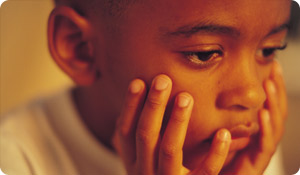
Does your child have trouble falling asleep at night? If so, he certainly isn't alone. Many children hate to go to bed; however, when his late nights leave him lacking enough z's, this can put him at risk for a number of health problems, ranging from being overweight to having trouble sitting still to an inability to concentrate in school.
Kids and Sleep Deprivation
The reasons why your child may not be getting enough sleep can vary. For many, it's insomnia, sleep apnea, over excitement, too busy of a schedule, or even control issues that contributes to sleeplessness. In addition, as children reach their teen years, a changing body clock can make it difficult to fall asleep on command. As a result of any, or all, of these problems, your child's designated bedtime may come and go, yet he may still be wide awake.
If you think sleep deprivation is not a big concern, consider this. While your child sleeps, his brain is quite active—moving through the phases of the sleep cycle every 90 minutes or so. Cycling through these phases multiple times a night is essential to allow your child's body to function properly. As a result, if sleep deprivation happens on an ongoing basis, he's bound to suffer on a number of levels.
Sleep Deprivation and Health Issues
The sleep deprivation and health connection has been confirmed through multiple studies. For instance, a study conducted in Denmark revealed that sleep deprivation can be directly linked to children's symptoms of attention-deficit hyperactivity disorder (ADHD). The study was eventually published in the Archives of Pediatrics and Adolescent Medicine in April of 2008.
Other researchers report similar findings and also list other behavioral and performance issues that are related to lack of adequate sleep. These can include cognitive challenges, difficulty in school and even psychopathology. In addition, another study included in the same journal issue that was led by researchers through Harvard Medical School also maked the link between sleep deprivation and childhood obesity, and says that the connection starts right in infancy.
Tackling the Issue
With increasing concern about children being overweight and putting themselves at risk for a number of health conditions, when and how your child sleeps takes on even greater importance for many parents. Furthermore, sleep deprivation has also been found to increase a child's risk of having anxiety and depression as an adult.
These findings should be enough to make you think twice the next time your child wants to stay up past bedtime. In addition, if he suffers from significant sleep deprivation on a regular basis, it's important to talk to your pediatrician about how best to address the issue.
Creating a calm environment at night and implementing a structured routine in the evenings can help your child get to bed on time. But in some cases, a therapist or sleep clinic can also provide helpful support to help your child get a good night's sleep and reap the benefits that come along with it.
Sources:
KidsHealth.org/From Nemours
http://kidshealth.org/teen/your_body/take_care/sleep.html#
American Psychological Association
http://www.apa.org/monitor/oct01/sleepteen.aspx
http://archives.cnn.com/2001/HEALTH/parenting/02/27/kids.sleep/
National Heart, Lung and Blood Institute
http://www.nhlbi.nih.gov/health/prof/sleep/res_plan/section2/section2a.html
Archives of Pediatrics and Adolescent Medicine
http://archpedi.ama-assn.org/cgi/content/abstract/162/4/305
http://archpedi.ama-assn.org/cgi/content/abstract/162/4/323
European Journal of Endocrinology
http://www.eje-online.org/cgi/content/abstract/159/suppl_1/S59





